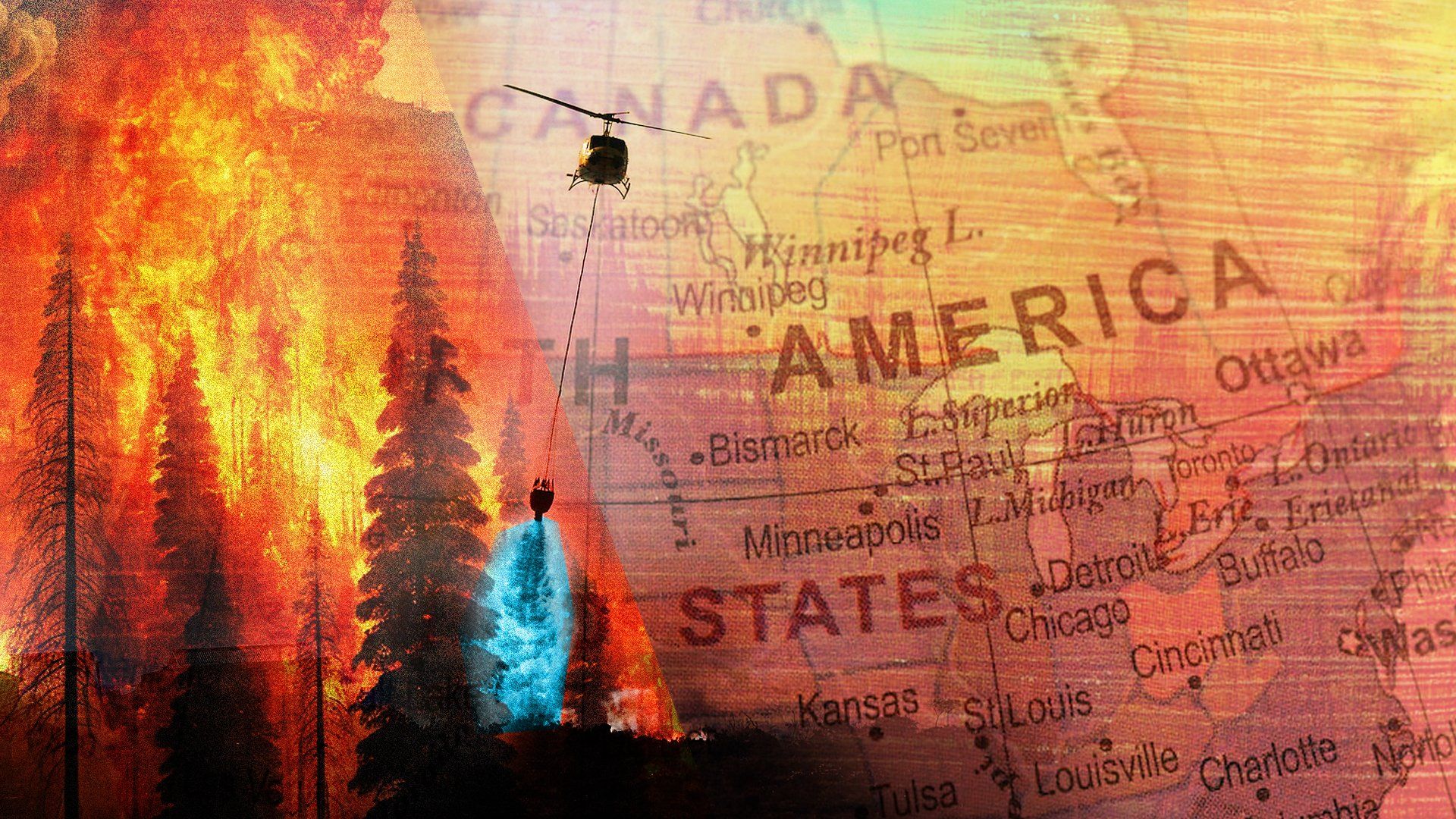Last year marked the worst wildfire season ever recorded in Canada as 18.5 million hectares of land burned — shattering the previous record of 10 million hectares in 1989. Those fires accounted for 23% of global wildfire carbon emissions in 2023. They also sent toxic smoke throughout the country and into the US, putting the health and safety of Americans at risk.
At one point, New York City had the worst air quality in the world as Americans were exposed to more smoke per person than ever before. The smoke, which reached as far as Florida, also put US crops at risk.
This year might be as bad — or worse — which means that domestic and cross-border policies for fighting fires will be more important than ever.
An early start to the wildfire season. Last week, Alberta declared an early start to the wildfire season. Dry conditions and warm weather brought about the premature arrival – roughly ten days ahead of the typical season. This comes as the province faces water shortages and prepares for a severe drought atop predictions of a dangerous fire season for the province.
Meanwhile, zombie fires continue to burn both there and in British Columbia — more than 150 of them never went out last year and managed to stay alight throughout the winter. Experts say the scale of the problem is unprecedented.
South of the border, Nebraska Gov. Jim Pillendeclared a state disaster on Monday as wildfires threatened residents near North Platte, mobilizing the National Guard to fight the blazes. Compared to Canada, the US wildfire season in 2023 was modest, but experts warned the calm could be atypical.
The year is barely underway and the US has already witnessed a record-setting fire. Texas on Thursday was battling the second-largest wildfire in US history and the largest, most destructive fire in the state’s history. The deadly, vast blaze, which began on Monday, has since spread across over one million acres.
Worse years to come. Climate change is exacerbating wildfires as the same hot, dry conditions that have started the season early in Alberta make them more likely to start and harder to fight year after year. The coming seasons will approach or break records, with the US set to face the effects from both domestic wildfires and Canadian counterparts. In 2023, summer warnings pointed to a heavy year for both countries as “unprecedented” fires raged and spewed smoke across the border.
In January, observers were already worrying about the 2024 fire season in Canada, citing a combination of climate change and the El Niño effect, which will produce conditions favorable for wildfires. Last year was the hottest on record for the world, and as routinely warmer years are set to be the norm experts are calling for proactive, cooperative policy responses across borders.
Cross-border cooperation remains resilient. For years, Canada and the US have managed to cooperate on shared concerns — even during times of political challenges.
“Regardless of the politics, cross-border cooperation between provinces and states, and between agencies and departments of both federal governments, is good and seamless regardless of the political leaders in power," says Graeme Thompson, a senior analyst with Eurasia Group’s global macro-geopolitics practice.
The cooperation, Thompson says, is thanks to a “seamless and well-rehearsed order of operations.” The two countries even managed to keep that cooperation up and running during the Trump years, which were, to say the least, fraught.
Recently, the need for cross-border efforts to manage disasters has grown. As the fires raged and smoke blanked much of the continent last summer, Natural Resources Canada and the US Departments of the Interior and Agriculture signed a memo of understanding committing them to enhanced cooperation in fighting wildfires. They pledged to focus on building out a framework for mutual assistance, cooperation, and procedures for resource sharing. That work is ongoing.
A few weeks earlier, in an interview with the CBC, Canada’s then-minister of public safety and emergency preparedness Bill Blair said he’d spoken with the head of the US Federal Emergency Management Agency (FEMA) about better cooperation between the two countries, including the potential for “a NORAD-like approach,” noting that emergencies including floods, earthquakes, and wildfires were “borderless.”
At the same time, Canada — which doesn’t have a central, national disaster management agency — was also considering creating its own version of FEMA. Since then, discussion of those options has fallen off the radar (sure to return before long), but the US and Canada are nonetheless prepared to cooperate across the border to fight fires in 2024, guided by the Arrangement on Mutual Assistance in Fighting Forest Fires.
Gordon Sachs of the US Forest Service says the arrangement is “fully in place” and “has no end date.” The origins of the deal, which allows the US and Canada to share expertise and operations capacities to fight fires, stretches back to 1982. Sachs points out that since the 1980s, Canada and the US have provided fire fighting resources to one another in 37 of 40 years.
The newly-enhanced arrangement will take things further. Sachs says the 2023 renewal “goes beyond fire suppression to include training, research, and post-fire activities such as rehabilitation and restoration of burned areas.”
Whatever the 2024 fire season brings, US-Canadian cooperation on disasters, including wildfires, will likely increase in years to come. Climate change is already exacerbating natural disasters and their effects, many of which, as Blair noted, are borderless. Changes in the US administration in 2024 could prove a challenge at the worst possible time, but if past is prologue, there’s reason to believe cross-border cooperation on disaster responses will remain reliable.
